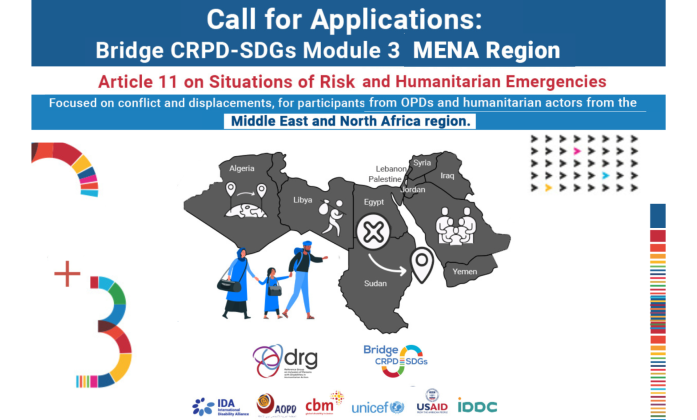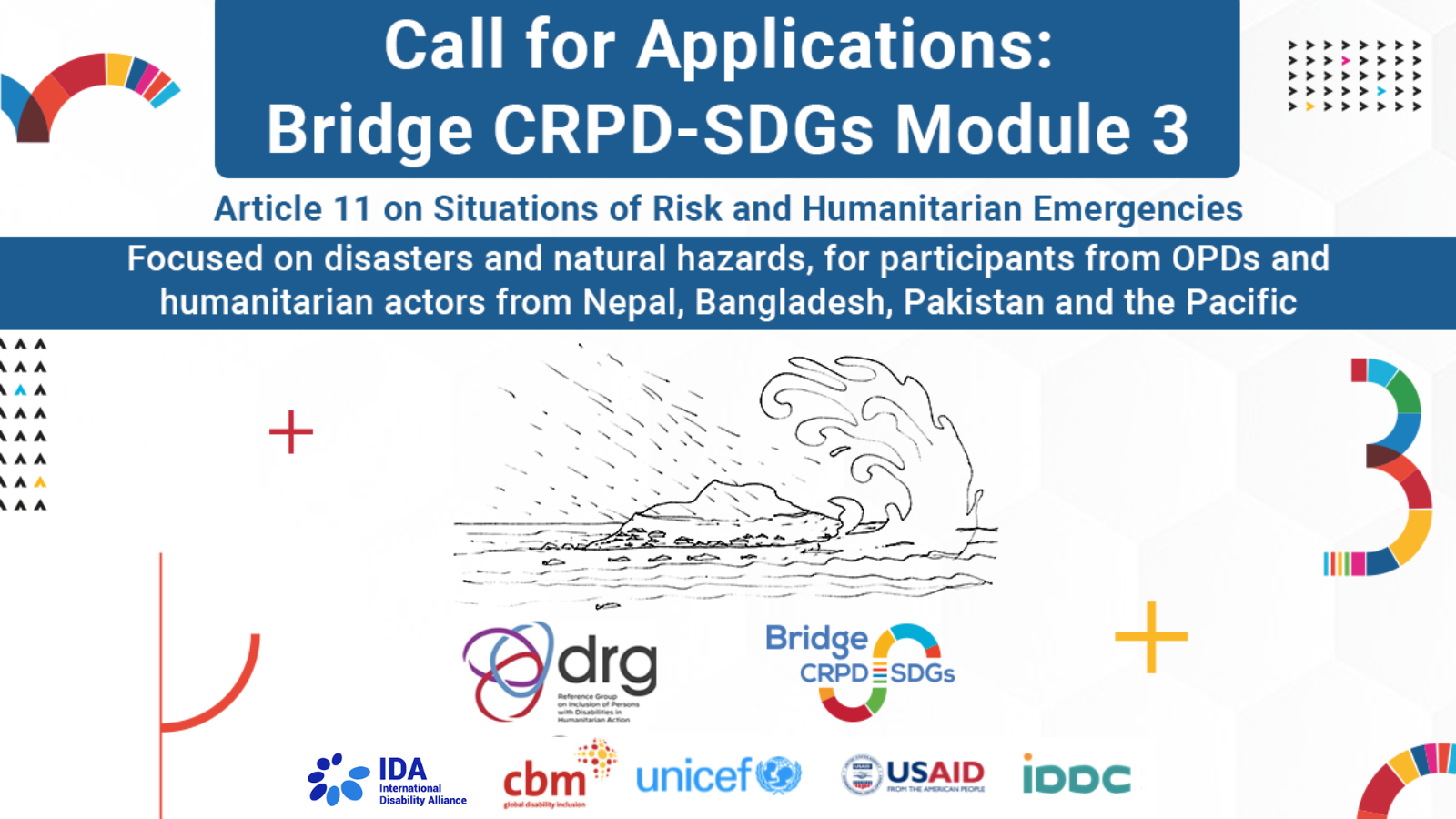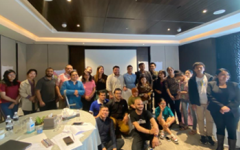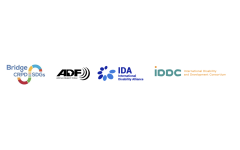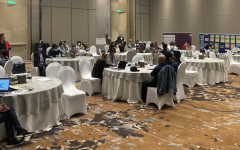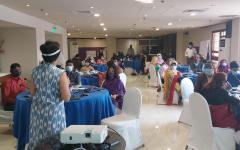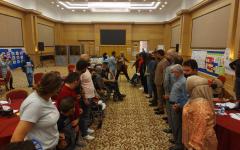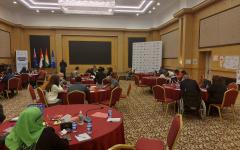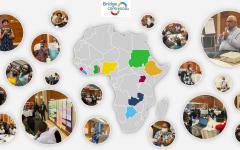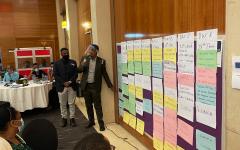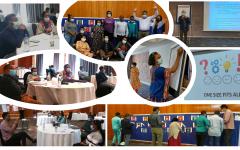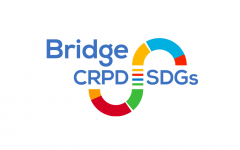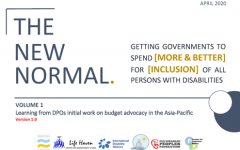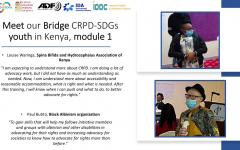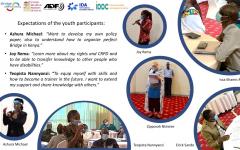>> Updates from Days 2-4 (13-15 April)
>> Main Page: Bridge CRPD-SDGs First Module Uganda
On This Page:
- Day 5 - Monday, 16 April 2018
- Day 6 - Tuesday, 17 April 2018
- Day 7 - Wednesday, 18 April 2018
- Informal Evaluation of the Week
Day 5 – Monday, 16 April 2018
The morning recap of yesterday’s learnings focused on the SDGs and the 5Ps of Agenda 2030 (People, Prosperity, Partnership, Peace and Planet). This led into a further discussion about how the legally binding nature of the CRPD is essential to ensure accountability of governments, and participants were given a taste of the content of Bridge Module Two when touching on the process of legal harmonisation.
This was followed by a ‘five-minute one article’ slot, on Article 6 on Women with Disabilities. The group of participants took us through a role-play of women in a job interview situation, and cofacilitators provided feedback highlighting the prevalence of gender discrimination and the cross-cutting nature of this specific article across the convention. Participants were invited to read the CRPD Committee General Comment 3, with its mention of repealing and adapting discriminatory laws, collecting data, inclusive international cooperation and providing support to women with disabilities. It was highlighted that organisations must have disability and gender policies in place.
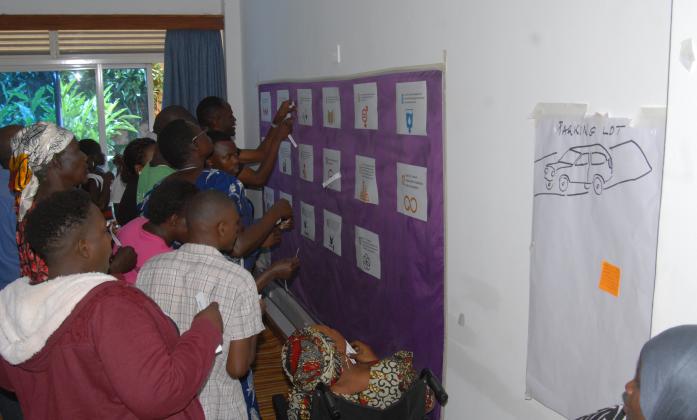
The Ugandan cofacilitators introduced the following session, ‘What States have to do to implement CRPD and SDGs’, starting with a reminder on how rights translate the needs of people and that resources have to be allocated to ensure its implementation. In addition, facilitators recalled the general States obligations to ‘Respect, Protect and Fulfil’ the rights of persons with disabilities under the CRPD. There was an explanation on the difference between immediate and progressive realisation, with a focus on Uganda, and a discussion on how advocacy from DPOs can ensure that both concepts are used in the correct situations. The group was taken through some of the important factors that ensure effective implementation.
To explore these concepts, and get exposed to them in practice, the participants were then divided into four groups (on Independent Living, Health, Employment and Livelihood, and Access to Justice) with the task to explain to commissioners from the African Union (AU) the situation of persons with disabilities in Uganda regarding these specific topics. Co-facilitators from different African countries played the AU commissioners and intervened with comments and questions. During and after the session, several learnings for participants were identified, including the need to use tangible examples, the need to have genuine evidence (including real cases and data), the need to keep focus, and how it is essential for DPOs, in their preparation, to exhaust every source of information.
Useful guiding questions include:
- What policies are in place?
- How is government prioritising resource allocation (specifically regarding disability)?
The session was summarized with the reminder of the ‘needs, rights and resources’ triangle and the state’s obligation to closely consult and actively involve persons with disabilities, and their representative organisations, under article 4.3 of the CRPD.
The four groups received the task to work in a presentation by groups that would be presented the day after highlighting the national situation of persons with disabilities in Uganda, with the legal framework, policies and programs, and recommendations to improve a situation.

The day closed with a ‘five-minute one article’ session, on Article 14, Liberty and Security of the Person, and Article 17, Protecting the Integrity of the Person, which the group decided to present separately.
Day 6 – Tuesday, 17 April 2018
During the morning recap, the States’ obligations were covered, with a reminder on the details of ‘respect, protect and fulfil’. It was highlighted that the reiteration of the ‘needs, rights and resources’ concept helps in the learning process and there was discussion around challenges of ensuring the SDGs are implemented in an inclusive way.
The recap was followed by ‘two-minute one article’ session, with presentation of article 33 ‘National Implementation and Monitoring’, where Ugandan co-facilitation team provided local context; followed by a presentation of the article 31 ‘Statistics and Data Collection’, with the need for consistency in data gathering, and explanation of the situation in Uganda, including recommendations from the CRPD Committee on involvement of DPOs in this process.
This session was followed by a substantive session on the Right to Education. The session was introduced and explained by two co-facilitators with autism and intellectual disabilities, using an extremely inclusive and easy-to-understand methodology, with a powerful personal testimony that highlighted the importance of the inclusive education system to persons with disabilities and other marginalised groups. Participants engaged in a vibrant discussion, including challenges, such as lack of accessibility and stigma, but also positive overview, including its importance to build confidence for future employment, changes attitudes of fellow pupils and staff, and contribution to a more inclusive community. One participant highlighted how, as children grow together, they will grow with a healthy understanding of each other’s differences. There was then a facilitated discussion around practical measures that need to be taken, including preparation of schools, teachers and curricula, and how an inclusive system, when properly implemented, can address budget considerations.
Co-facilitators invited a support person to share about its role to support the inclusion of a person with intellectual disability, showing how they simply ensure that a person receives information in a way they can understand and can articulate themselves effectively.
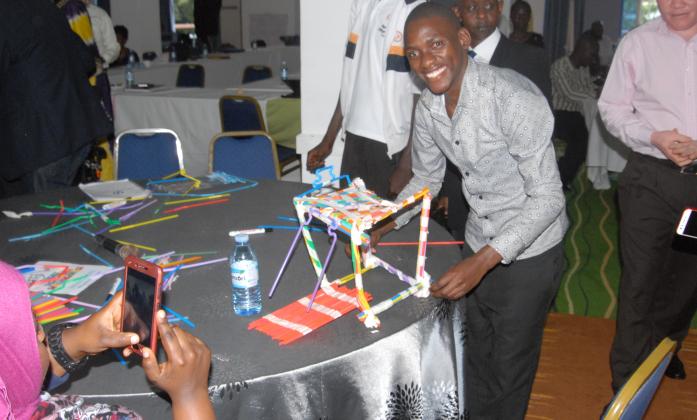
The session was concluded with a constructive discussion on the importance of education in sign language to deaf people and the importance for them to share with non-deaf pupils about their culture and substantive discussions on inclusive quality education for all.
The major part of the day was dedicated to presentations of each group on Independent Living, Employment and Livelihood, Access to Justice and Health. All presentations were followed by interactive discussions. This challenging exercise gives more experience of the pressure of delivering an effective presentation on the national implementation of the rights of persons with disabilities. Detailed feedback was provided by the facilitation team, with specific attention paid to whether methodology and content of the presentation were inclusive and clear.
Day 7 – Wednesday, 18 April 2018
The last day of the week started with two exercises, a ‘two-minute one article’ analysis of Article 12 ‘Equal Recognition before the Law’, then a ‘five-minute one article’ presentation on article 8 ‘Awareness Raising’. Co-facilitators and participants provided feedback on both, highlighting key points of the articles and recommending the reading of the CRPD Committee Concluding Observations for Uganda related to both.
This session was followed by a brief session answering some of the participants’ questions shared in the ‘parking slot’. The main question was around the differences between some specific disabilities, including between persons with intellectual and psychosocial disabilities, and people with vitiligo and people with albinism. The facilitation team invited participants from underrepresented groups to share about their specific group and co-facilitators from the same group facilitates the discussions.
The ‘recap session’ was made with a quick ‘burning ball’ exercise, that tested the group’s knowledge on random aspects of the week’s training. This light-hearted game reinforced some of the essentials of the curriculum, with short questions on the content of the CRPD, specifics taken from general comments of the CRPD and linkages with the SDGs.
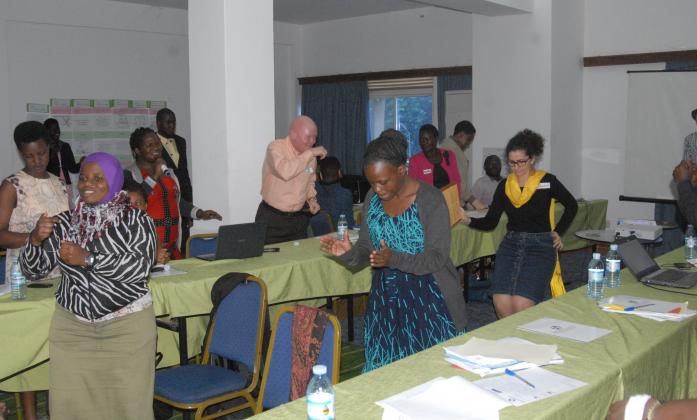
The group then reflected on inclusiveness. Co-facilitators encouraged the group to think about the different ways in which content had been presented to them throughout the training, including the various methods used to provide feedback and evaluate, and then to comment on how these had worked. This exercise gave everyone an opportunity to reflect on different methodologies for inclusive training but, at a higher level, it gave us a basis to realise and discuss the importance of different DPOs working together for a common goal.
This session led to another short practical group exercise on the ‘inclusive disability movement’; where a ‘house’ should be built only using straws and tape. The exercise served to highlight the importance of collaboration, sharing ideas, learning from each other and starting from strong foundations. The Ugandan cofacilitators summed up the session referring to specific networks and encouraging future teamwork.
The lead facilitators then explained the next steps. This covered the second module (in seven months’ time) and the assignments that are expected before then. These assignments will focus on aspects of CRPD implementation in Uganda, with the specific subject being of the participants choice (anything from public policy to data). They will cover socio-economic influences such as geographic location and income, and include references to factors such as human rights treaties, Gross domestic product (GDP), public expenditure and presence of DPOs. This, followed by the next level of training, is designed to bring context to the fundamental understanding of the CRPD and SDGs obtained during the week.
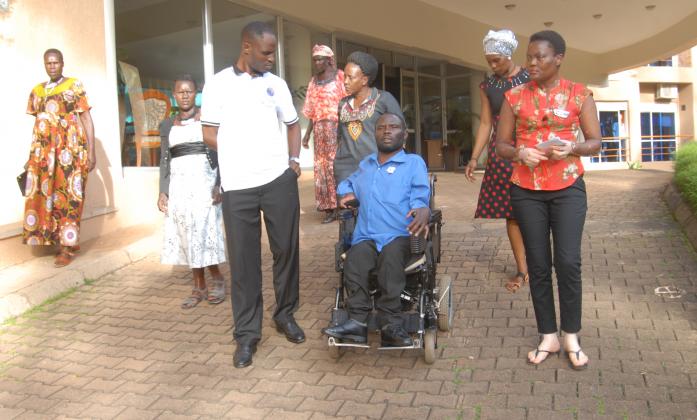
The week closed with an informal group feedback where everyone (participants and all facilitators) were invited to share key moments and ‘take away learnings’ from the training. There were many specifics - for example, appreciation of understanding of the difference between accessibility and reasonable accommodation, linkages between the CRPD and the SDGs and how the disability movement can become inclusive of underrepresented groups. However, the common thread throughout the feedback was a raised awareness of the benefits of advocating together: Bridge will help us amplify our voices!
Some informal evaluation of the week:
- Learned to link the SDGs with the CRPD and how this can benefit our movement;
- I learned about participation. When we have same opportunities, at the same time, we see that other people can also participate very much;
- I learned here that the most important thing is self-advocacy;
- I learned that learning is a process and that we learn better when we support each other,
- I was advocating by commitment, but now I learned about inclusion, I learned to include the ones that are left behind, to include everyone;
- I have been organising several meetings, interventions, but I must confess that I have not been including captions that would benefit hard of hearing people. Today this is something that I have learned and I will make sure that I will be more inclusive of them;
- I realised that our State has many things to do for us. It is their obligation. Even if we have people supporting us, the responsibility to protect and fulfil is of the State;
- Even if I was facilitating workshops on the CRPD previously, I learned now that I still have lots of things to learn, including on being more inclusive;
- I have learned that teamwork is the first way to achieve! We learned how to use the best of each of us. Some of us came here not knowing what the CRPD was really about. Now we know disability is not inability. I never saw a person with deaf-blindness in my life before and I saw blind people reading. It was very impactful;
- Appreciated the alternative material. It is my first time that I saw all these different constituencies and I liked to see the sign languages interpreters;
- We need to manage our resources properly and this needs planning. We all have the capacity to create changes and it will depend on our capacity to develop our abilities to make changes. Information is key and we need to equip ourselves with this to make our advocacy effective.
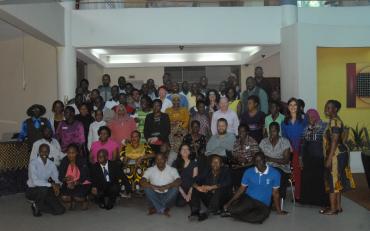
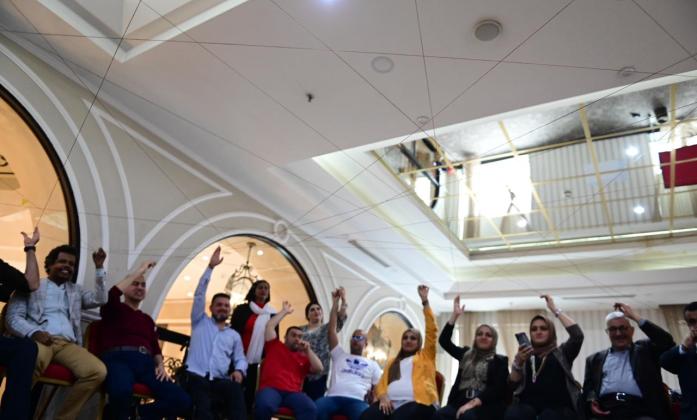 Bridge CRPD-SDGs is an intensive training programme that aims to support organisations of persons with disabilities (DPOs) and disability rights advocates to develop an
Bridge CRPD-SDGs is an intensive training programme that aims to support organisations of persons with disabilities (DPOs) and disability rights advocates to develop an